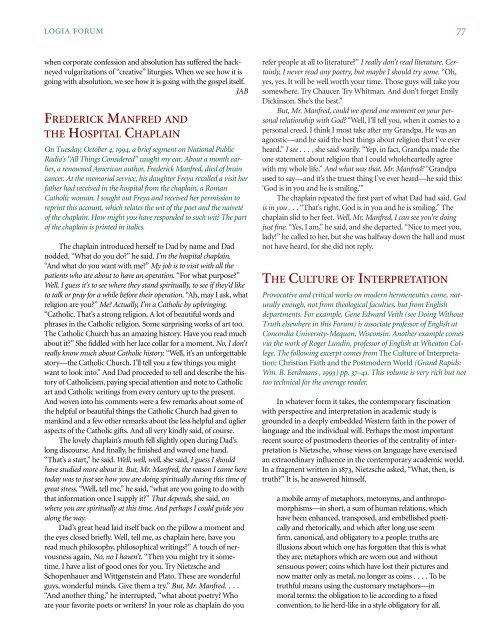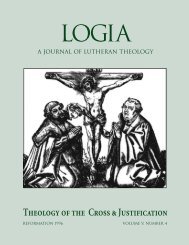LOGIA FORUM 77when corporate confession and absolution has suffered the hackneyedvulgarizations of “creative” liturgies. When we see how it isgoing with absolution, we see how it is going with the gospel itself.JABFREDERICK MANFRED ANDTHE HOSPITAL CHAPLAINOn Tuesday, October 4, 1994, a brief segment on National PublicRadio’s “All Things Considered” caught my ear. About a month earlier,a renowned American author, Frederick Manfred, died of braincancer. At the memorial service, his daughter Freya recalled a visit herfather had received in the hospital from the chaplain, a RomanCatholic woman. I sought out Freya and received her permission toreprint this account, which relates the wit of the poet and the naivetéof the chaplain. How might you have responded to such wit? The partof the chaplain is printed in italics.The chaplain introduced herself to Dad by name and Dadnodded. “What do you do?” he said. I’m the hospital chaplain.“And what do you want with me?” My job is to visit with all thepatients who are about to have an operation. “For what purpose?”Well, I guess it’s to see where they stand spiritually, to see if they’d liketo talk or pray for a while before their operation. “Ah, may I ask, whatreligion are you?” Me? Actually, I’m a Catholic by upbringing.“Catholic. That’s a strong religion. A lot of beautiful words andphrases in the Catholic religion. Some surprising works of art too.The Catholic Church has an amazing history. Have you read muchabout it?” She fiddled with her lace collar for a moment. No, I don’treally know much about Catholic history. “Well, it’s an unforgettablestory—the Catholic Church. I’ll tell you a few things you mightwant to look into.” And Dad proceeded to tell and describe the historyof Catholicism, paying special attention and note to Catholicart and Catholic writings from every century up to the present.And woven into his comments were a few remarks about some ofthe helpful or beautiful things the Catholic Church had given tomankind and a few other remarks about the less helpful and uglieraspects of the Catholic gifts. And all very kindly said, of course.The lovely chaplain’s mouth fell slightly open during Dad’slong discourse. And finally, he finished and waved one hand.“That’s a start,” he said. Well, well, well, she said, I guess I shouldhave studied more about it. But, Mr. Manfred, the reason I came heretoday was to just see how you are doing spiritually during this time ofgreat stress. “Well, tell me,” he said, “what are you going to do withthat information once I supply it?” That depends, she said, onwhere you are spiritually at this time. And perhaps I could guide youalong the way.Dad’s great head laid itself back on the pillow a moment andthe eyes closed briefly. Well, tell me, as chaplain here, have youread much philosophy, philosophical writings?” A touch of nervousnessagain, No, no I haven’t. “Then you might try it sometime.I have a list of good ones for you. Try Nietzsche andSchopenhauer and Wittgenstein and Plato. These are wonderfulguys, wonderful minds. Give them a try.” But, Mr. Manfred. ...“And another thing,” he interrupted, “what about poetry? Whoare your favorite poets or writers? In your role as chaplain do yourefer people at all to literature?” I really don’t read literature. Certainly,I never read any poetry, but maybe I should try some. “Oh,yes, yes. It will be well worth your time. Those guys will take yousomewhere. Try Chaucer. Try Whitman. And don’t forget EmilyDickinson. She’s the best.”But, Mr. Manfred, could we spend one moment on your personalrelationship with God? “Well, I’ll tell you, when it comes to apersonal creed, I think I most take after my Grandpa. He was anagnostic—and he said the best things about religion that I’ve everheard.” I see . .., she said warily. “Yep, in fact, Grandpa made theone statement about religion that I could wholeheartedly agreewith my whole life.” And what was that, Mr. Manfred? “Grandpaused to say—and it’s the truest thing I’ve ever heard—he said this:‘God is in you and he is smiling.’”The chaplain repeated the first part of what Dad had said. Godis in you . . . “That’s right, God is in you and he is smiling.” Thechaplain slid to her feet. Well, Mr. Manfred, I can see you’re doingjust fine. “Yes, I am,” he said, and she departed. “Nice to meet you,lady!” he called to her, but she was halfway down the hall and mustnot have heard, for she did not reply.THE CULTURE OF INTERPRETATIONProvocative and critical works on modern hermeneutics come, naturallyenough, not from theological faculties, but from Englishdepartments. For example, Gene Edward Veith (see Doing WithoutTruth elsewhere in this Forum) is associate professor of English atConcordia University-Mequon, Wisconsin. Another example comesvia the work of Roger Lundin, professor of English at Wheaton College.The following excerpt comes from The Culture of Interpretation:Christian Faith and the Postmodern World (Grand Rapids:Wm. B. Eerdmans , 1993) pp. 37–41. This volume is very rich but nottoo technical for the average reader.In whatever form it takes, the contemporary fascinationwith perspective and interpretation in academic study isgrounded in a deeply embedded Western faith in the power oflanguage and the individual will. Perhaps the most importantrecent source of postmodern theories of the centrality of interpretationis Nietzsche, whose views on language have exercisedan extraordinary influence in the contemporary academic world.In a fragment written in 1873, Nietzsche asked, “What, then, istruth?” It is, he answered himself,a mobile army of metaphors, metonyms, and anthropomorphisms—inshort, a sum of human relations, whichhave been enhanced, transposed, and embellished poeticallyand rhetorically, and which after long use seemfirm, canonical, and obligatory to a people: truths areillusions about which one has forgotten that this is whatthey are; metaphors which are worn out and withoutsensuous power; coins which have lost their pictures andnow matter only as metal, no longer as coins .... To betruthful means using the customary metaphors—inmoral terms: the obligation to lie according to a fixedconvention, to lie herd-like in a style obligatory for all.
78 LOGIAFor Nietzsche and his ideological descendants, all knowledgeis a matter of perspective; that is, it is an issue of interpretation, andall interpretations are lies. It would be impossible for matters to beotherwise, Nietzsche would argue, because the only relationship oflanguage to reality, of words to things, is that which has been establishedby acts of violence and power and through the agencies ofhabit and convention. If we deceive ourselves by believing in a“deep sense of how things are which it is the duty of philosophersto spell out in language,” argues Rorty, an honest analysis will showus that what we call “common sense” is nothing more than a “dispositionto use the language of our ancestors, to worship thecorpses of their metaphors.” Metaphors originally gain their statusas “truth” through acts of force and deception by those who promulgatethem; those metaphors retain their power for succeedinggenerations only because of the predominance of sloth, ignorance,and forgetfulness in the human species. Since all uses of languageinvolve deception, Nietzsche claims, one can do nothing morethan seek to dissemble with power and effectiveness. According toNietzsche, one lies for the purpose of satisfying one’s desires ordeepest needs:In this condition [of intoxication] one enriches everythingout of one’s own abundance: what one sees, whatone desires, one sees swollen, pressing, strong, overladenwith energy. The man in this condition transforms thingsuntil they mirror his power—until they are reflections ofhis perfection. This compulsion to transform into theperfect is—art.If Nietzsche is a most prominent recent source for contemporarytheories of interpretation, we may track other influences—including, of course, those that helped to shape the thought ofNietzsche—back through several centuries. We can begin with theseventeenth century, at which time the outlines of a general theoryof hermeneutics began to emerge even as a skeptical but influentialminority in the Western world began to lose its faith in classicaltheism. In one sense, the decline of theism made inevitable the riseof what Robert Solomon has called our modern “transcendentalpretense” of the self. In another sense, however, the promotion ofthe transcendental self was itself one of the most powerful forcesthat quickened the pace at which a theistic understanding of transcendencelost its power as a unifying cultural force.To claim that our contemporary passion for interpretive theorystarted to develop in earnest only in the seventeenth and eighteenthcenturies is not to argue, of course, that hermeneutics is inany way a new subject. In Greek mythology, Hermes was the messengerwho shuttled back and forth between the conclaves of thegods and the world of mortals, conveying word of the divine judgmentson human affairs. In Jewish and Christian history, hermeneuticalactivity flourished long before the name of Hermes everbecame attached to a formal discipline in the eighteenth century.In both the classical and the Christian worlds, hermeneutics as apractice involved the effort to translate what was taken to be adivine, authoritative word into language that would have powerand relevance for a particular community.As interpreters began to reflect self-consciously about theirpractices in the early modern era, however, this long establishedview of interpretation underwent a dramatic transformation.With traditional texts and beliefs being questioned in revolutionaryways at that time, interpreters could no longer assume the reliabilityor authority of the documents and doctrines they were tryingto understand. One consequence was that, by the time of theromantic movement, hermeneutics had come to be associatedwith the search for ways of making discredited texts relevant toskeptical readers, rather than with the task of explaining anauthoritative word or command. Instead of assuming the authorityof the text in question, the romantic interpreter had to provethat authority by demonstrating the text’s power to provide acoherent explanation of the experience of its audience. In manyways, romanticism in literature and theology was a dramaticeffort to snatch the ethical, aesthetic, and emotional relics of theChristian faith from its metaphysical house, which was being consumedby the flames of skepticism.In Christian proclamation under the influence of romanticism,the new understanding of hermeneutics led to a preoccupationwith the status of the audience to be addressed with thegospel. Pressured to demonstrate the relevance of Christian faithto its “cultured despisers” (Schleiermacher’s memorable phrase),many Christian interpreters in the Enlightenment and romanticismpared the biblical narrative into an appealing shape in theirattempts to appeal to an educated and often cynical audience.Whether they were promoting a rational or a romantic God, theseearly modern interpreters were often willing to spend the capital ofChristian belief in exchange for earning high interest in the marketplaceof intellectual currency.From a philosophical standpoint the romantic movement hadits origins in the Cartesian revolution of the early modern period.It was Cartesianism that had prompted Western thinkers to believethat the isolated, unaided self had the power to discover truththrough its own ratiocination. This Cartesian confidence in turnserved to promote the utopian visions of human progress and happinessthat would figure so prominently in eighteenth-centurythought. It was when this utopianism suffered dramatic setbacks atthe hands of epistemological skepticism and the French Revolutionthat the romantic understanding of hermeneutics was born.In the intellectual world, the romantic age bequeathed to us apsychological and grammatical understanding of the hermeneuticalprocess; and in the culture as a whole, romanticism has played akey role in bringing about “the triumph of the therapeutic.” Atherapeutic culture seeks to promote the efforts of the autonomousself to discover fulfillment independent of the restraints of precedentand community. “Ours is the first cultural revolution foughtto no other purpose than greater amplitude and richness of livingitself,” Philip Rieff argues. In that cultural revolution, the theory ofinterpretation has come to serve as a most useful tool in therapeutichands. If Rorty is right when he celebrates the complete triumphof romanticism in Western culture—“About two hundredyears ago, the idea that truth was made rather than found began totake hold of the imagination of Europe”—then construction hascome to replace discovery as the basic metaphor of the mind’sactivity. In a world where all truth is made rather than found,thought has no task except that of constructing interpretations thatmay help us live contentedly in a world where nothing is at stakebeyond the therapist’s “manipulatable sense of well-being.”
















